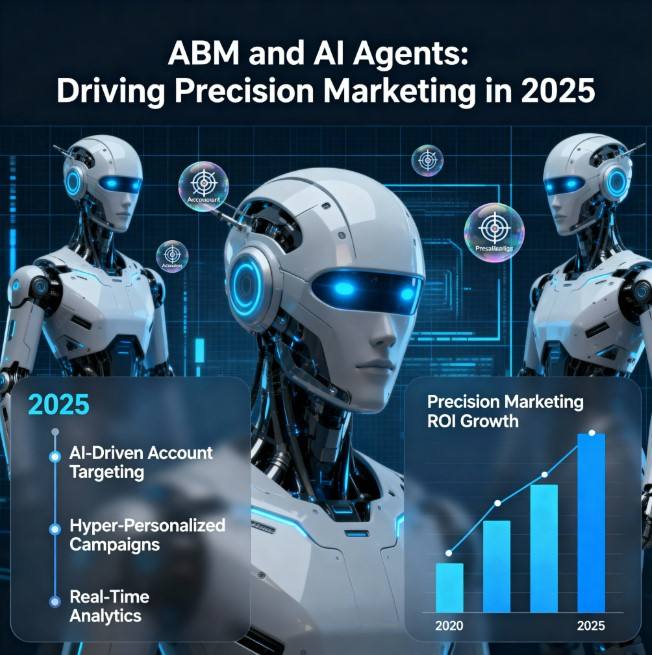Account-Based Marketing (ABM) has always been about focus — identifying the right accounts, engaging the right stakeholders, and personalizing every touchpoint to accelerate deal velocity. However, in 2025, AI agents are reshaping this landscape.
As B2B buyer journeys become more digital and decentralized, marketers are under pressure to deliver hyper-personalized engagement at scale. Traditional manual ABM workflows simply can’t keep up. This is where AI agents — intelligent, autonomous digital assistants — are transforming how ABM campaigns are planned, executed, and optimized.
In this blog, we’ll explore how AI agents are driving precision marketing, what challenges they solve, actionable strategies for integration, and what the future holds for AI-powered ABM.
What is ABM and Why It Matters in 2025
Account-Based Marketing (ABM) is a strategic approach that aligns marketing and sales efforts to focus on high-value target accounts rather than broad lead generation.
The goal is simple: engage fewer accounts but win more deals.
In 2025, this approach has evolved beyond human-led execution. AI agents — powered by machine learning, predictive analytics, and natural language processing — now assist in every stage of ABM, from data orchestration to personalized outreach.
According to Gartner, over 60% of B2B marketing teams have adopted AI-powered account selection or engagement tools in 2025. AI agents make ABM more scalable, data-driven, and conversion-optimized than ever before.
Challenges in ABM Execution for Martech Leaders
Despite ABM’s clear benefits, many B2B marketers face roadblocks such as:
- Data fragmentation: ABM success depends on unified insights from CRM, intent data, web analytics, and engagement signals — but most systems remain siloed.
- Manual processes: Personalizing outreach for each account is resource-intensive.
- Misaligned teams: Sales and marketing often interpret ABM metrics differently, causing strategy gaps.
- Scalability issues: Expanding ABM to hundreds of accounts without automation strains bandwidth and budgets.
- Content overload: Teams struggle to deliver tailored content that resonates with each buying committee.
AI agents directly address these challenges by automating research, streamlining workflows, and improving personalization precision.
Proven Strategies to Leverage AI Agents in ABM
1. Automated Account Identification and Prioritization
AI agents analyze behavioral, intent, and firmographic data across sources like Bombora, 6sense, and LinkedIn to identify accounts showing active buying intent.
They prioritize these accounts based on engagement scores, allowing marketers to focus on opportunities with the highest conversion potential.
2. Predictive Personalization
Using machine learning, AI agents craft dynamic buyer journeys by analyzing real-time interaction data. They tailor emails, ads, and website experiences to each stakeholder’s interest, ensuring relevance across every touchpoint.
3. AI-Powered Outreach and Content Distribution
AI-driven writing tools like Jasper or ChatGPT-powered integrations can draft personalized outreach messages, optimize ad copy, and even generate relevant case studies for each account segment.
This not only saves time but ensures consistency in tone and brand messaging.
4. Conversation Intelligence
AI agents monitor communication across email threads, chats, and calls to identify buyer sentiment, intent level, and objections. These insights help sales teams adjust messaging and timing to close deals faster.
5. Intent Signal Interpretation
AI can correlate external intent data (e.g., keywords searched, competitors researched) with internal CRM engagement. This helps teams predict buying readiness and trigger automated outreach workflows at the optimal moment.
Trends and the Future of AI-Powered ABM
The integration of AI agents is pushing ABM into its next evolution — Predictive, Proactive, and Personalized.
Here’s what’s shaping the future:
- Autonomous Campaign Optimization:
- AI agents will not just analyze campaigns but autonomously adjust bids, targeting, and creative assets for maximum ROI.
- Voice and Conversational ABM:
- Expect voice-based AI agents to conduct human-like conversations with prospects on behalf of sales teams — qualifying leads faster.
- Hypergranular Targeting:
- AI will move beyond account-level to individual decision-maker personalization, predicting behavioral shifts in real-time.
- AI-Driven ABM Platforms:
- ABM tech stacks will consolidate — platforms like Demandbase, Terminus, and RollWorks are already embedding AI orchestration features.
- Privacy-Aware Personalization:
- With stricter data regulations, AI agents will leverage first-party data modeling for compliant, accurate targeting.
Pro Tips & Bonus Insights
- Start Small, Scale Fast: Begin AI integration with account prioritization and personalization before automating full campaigns.
- Align AI with Human Expertise: AI agents enhance, not replace, human creativity and relationship-building.
- Integrate Seamlessly: Ensure your CRM, CDP, and ABM platform share unified data streams.
- Use AI for Content Intelligence: Identify which content drives engagement by analyzing performance metrics across channels.
- Monitor Bias and Accuracy: Continuously train AI models to avoid misinterpretation of signals or over-personalization.
Conclusion
The synergy between ABM and AI agents marks a pivotal shift in how B2B organizations build and nurture relationships.
By automating manual processes, personalizing engagement at scale, and predicting buyer behavior, AI agents enable marketers to focus on what truly matters — strategy, creativity, and revenue impact.
In 2025, the winners in B2B marketing won’t be those who spend more but those who leverage AI to think smarter, act faster, and connect deeper.
Ready to revolutionize your ABM strategy with AI precision?
